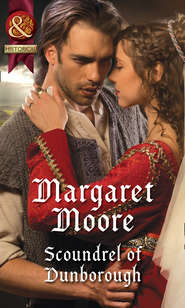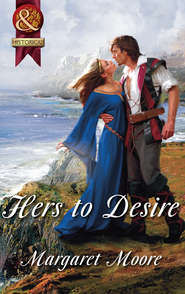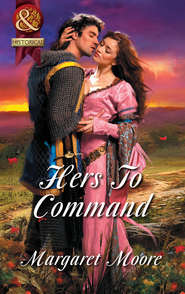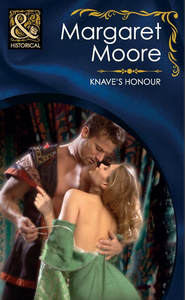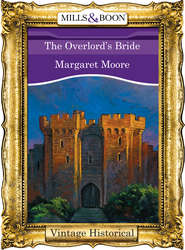По всем вопросам обращайтесь на: info@litportal.ru
(©) 2003-2025.
✖
Lord of Dunkeathe
Автор
Год написания книги
2018
Настройки чтения
Размер шрифта
Высота строк
Поля
HE WAS COMING TOWARD HER? By the saints, what was he going to say, or do? Maybe he was going to suggest…improprieties.
Riona’s breathing quickened as she told herself she’d ensure he understood that she was a lady of virtue and honor. She wasn’t a servant to whom he could make insolent suggestions.
And she shouldn’t be blushing like an addlepated girl as he continued to stroll toward her with that leisurely yet purposeful stride.
If she quit staring at him, perhaps he’d be satisfied and leave her alone.
“You there!” a woman called out imperiously.
The soldier halted and they both turned toward the wagon from whence the voice came.
It sported a painted canvas covering that had an opening at the back like the flaps of a tent, now held apart by an apple-cheeked, middle-aged maidservant, her hair covered by a white scarf, her dress one of dark brown wool. Seated beside the maidservant was a pale young woman with blond hair wearing a gossamer veil of white silk kept in place by a thin gold coronet. Her neck was long and slender, and the square bodice of her dark green silk gown was embroidered with golden thread. As for her features, she would have been very beautiful, had her ruby-red lips not been drawn up into a disdainful sneer.
“Yes, you,” she said in a haughty drawl as she addressed the solider. “Come here.”
He did as he was ordered.
The rich beauty raised a bejeweled hand. “Unload that,” she commanded, gesturing at a nearby wagon containing several wooden chests and boxes. “Ask my father, Lord Chesleigh, where they should go. And see that you don’t break anything, or I’ll have you whipped.”
“As you wish, my lady,” the soldier replied, his voice low and deep and as powerful as the rest of him.
By his accent, he was not, and never had been, a peasant.
Perhaps he was in charge of the garrison here, although why he’d stoop to such manual labor was a mystery.
Riona continued to watch as he undid the rope across the back of the wagon that prevented the boxes and chests from falling out. One by one, he lifted the pieces of baggage and set them neatly on the cobblestones, his muscles bulging and his jerkin stretching across his broad back. Even when he was nearly finished, he’d barely broken a sweat.
The older nobleman Uncle Fergus had suggested might be Sir Nicholas joined the young lady at the wagon.
“Be careful with those,” he unnecessarily ordered the soldier before he addressed the lady. “I must say I’m most disappointed with our host. He should be here to greet us.”
“It’s just as well he’s not, Father,” she replied. “I’d like to change my gown before I meet him.”
“We’ve only been allotted two small chambers,” the nobleman grumbled.
“I’m sure that once you explain what we require, he’ll gladly provide it. You are Lord Chesleigh, after all.”
With that, the young woman put out her slender hand for him to help her, the golden rings on her fingers flashing in the sunlight. Rising with regal dignity, half crouching because of the canvas covering, she had to bend over before setting foot on the stool another servant hastened to set in place.
To give the beauty her due, she managed to invest even that activity with grace and dignity. As she straightened, her gown fell into smooth, fluid folds below her slender waist and the golden embroidery of her gown twinkled in the sunlight, while the gilded girdle about her slender hips shone. With her other hand, she held up her dress, exposing one delicate leather slipper before she stepped onto the ground.
It seemed almost a wonder she would deign to walk on anything so ordinary as cobblestones.
Lord Chesleigh glanced at the soldier. “Ask Martleby where the baggage of Lord Chesleigh and his daughter should go, and see that it’s taken there.”
“Yes, my lord.”
Lord Chesleigh ran an imperious gaze over the man. “And be quick about it.”
The Norman lord then swept past the soldier as if getting within three feet of him might stain his garments. His daughter followed at a more graceful pace.
Instead of tending to their baggage, however, or calling for assistance, the soldier turned and started toward Riona.
She tried not to squirm or give any sign of dismay, even if she was dismayed. And excited. Which she shouldn’t be. She should try to be dignified when she explained that she wasn’t a servant or merchant come to trade.
He stopped about a foot from her wagon and regarded her steadily with dark, inscrutable eyes whose gaze never wavered. Again, she felt entrapped by it, and him. Although the sensation should have been unpleasant, it wasn’t. It was…thrilling.
“Would you like me to help you with your baggage, too?” he asked in that deep, slightly husky voice that seemed to offer its own temptations, and convey more than a simple question.
What, in the name of the saints and Scotland, had come over her?
Before she could give an answer—any answer—a movement on the wall walk above made them both glance up at the guard there. With a look akin to panic directed toward the man on the ground, the guard immediately snapped to attention, and Riona realized this fellow facing her was most definitely not a common foot soldier.
A relatively young and handsome man who looked like he’d been trained in arms and combat, and one of whom all the hirelings seemed afraid….
Of course.
“No, thank you, Sir Nicholas,” she replied, giving him no sign that she was puzzled and curious. “I’m sure you’ve got plenty of other things to do.”
His brows lowered. “As a matter of fact, I do.”
“Then please, don’t linger here chatting with me. My uncle and I can manage our baggage quite well.”
The man she was now quite sure was Sir Nicholas of Dunkeathe bowed stiffly, then turned on his heel and strode away, leaving Riona to ponder why a Norman nobleman would pretend he was not.
A SHORT TIME LATER, the lord of Dunkeathe stood looking out the narrow arched window of his solar surveying the yard below, which was now almost clear of wagons, horses and guests.
The room was as austere as the man himself. No tapestries graced the smooth stone walls. An unpainted wooden chest with leather hinges and bronze lock that held the tithe rolls and accounts of the estate stood against the wall. The rest of the furnishings were likewise simple and plain, and the floor was bare. On a table near the door stood the only articles of any beauty—a silver carafe and two finely worked silver goblets.
His hands clasped behind his back, Nicholas watched the young woman who had guessed who he was, or perhaps found out some other way. Since he’d left the courtyard she’d gotten down off the rickety cart, but she hadn’t ventured from its side. She must still be waiting for her mistress or master to tell her where to go.
“Ten ladies, with their noble relatives, twenty-six servants, and one hundred and ten soldiers have arrived,” his steward noted behind him. “That’s two more ladies and their entourages than we’d expected.”
Which one of the nobles did that bright-eyed, brown-haired young woman belong to? Nicholas wondered. She wasn’t a servant of the complaining Lord Chesleigh and his beautiful daughter, or they would have chastised her for speaking to an unknown man.
She’d been amazingly and boldly impertinent to him in a way few women, and no servants, ever were. Indeed, she’d been so bold and intriguing, he’d been very tempted to suggest she join him in his bed. Her bright sparkling eyes seemed to promise passion and desire and excitement.
He wouldn’t have, of course. He’d never in his life seduced a servant. And he certainly shouldn’t now, when he was supposed to be wooing a wife.
Robert Martleby delicately cleared his throat, reminding Nicholas that he was still there.
Nicholas forced his mind to the issue at hand and turned to face his steward. “In spite of the unexpected arrivals, you’ve seen to it that all the guests and their servants have been accommodated?”
“Yes, my lord. We’ve had to pitch tents in the outer ward for several of the soldiers. I had some of ours join them, so there would be no accusations of poor treatment, and to keep an eye on them, as well.”
Nicholas nodded his approval. “You’ll have to find larger quarters for Lord Chesleigh and his daughter. He wasn’t pleased with those you assigned him. He thought they were too small.”
Robert frowned and studied the list in his hand.






